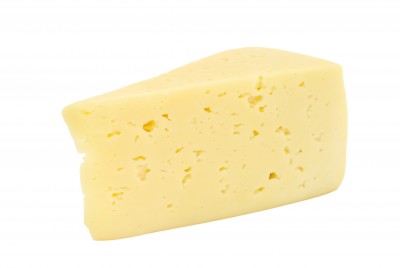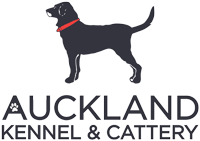There are plenty of people foods we’d love to share with our dogs, but some are much healthier than others. In fact, many foods humans eat are poisonous to dogs. Dogs and humans digest and metabolise food differently, and a dog’s digestive system cannot break down some of the foods we love to eat.
There are, however, certain human foods that can benefit our four-legged friends. But remember, human food should only ever be a treat for your dog – it should make up no more than 5% to 10% of their diet. To get the nutrients your dog needs, the rest should be real dog food.
To see some of human foods your dog can eat in moderation, check out this list:
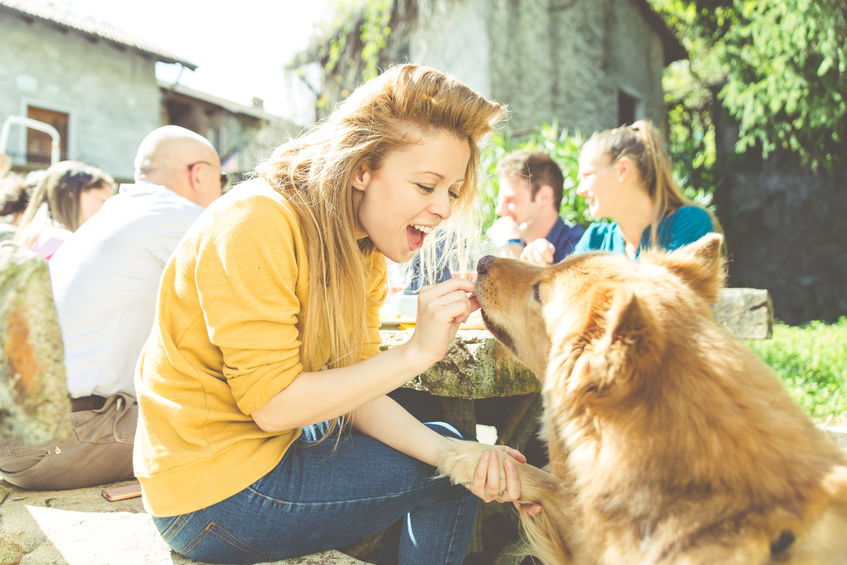
Human foods that make OK treats to feed your dog
Like anything when it comes to dogs and their diets, if you’re not sure, consult your vet. It is so much better to be safe than sorry.
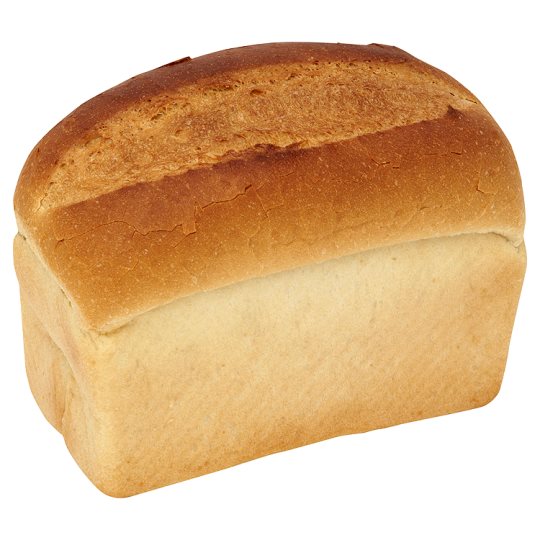
Bread:
Dogs can safely eat bread in much the same way as humans: in moderation. Small amounts of plain bread won’t hurt your dog, but neither will provide any health benefits. It has no nutritional value and can really pack on the carbohydrates and calories, just like in people. And remember, bread containing raisins, garlic, macadamias and Xylitol, an artificial sweetener, must be avoided – they’re poisons to dogs. Don’t give your dog sandwiches, because these are not treats to feed your dog; tomatoes are a big no-no for dogs.
As with any table scraps, feed your dog only very small pieces of bread at a time to avoid obesity-related diseases, like diabetes.
You may have heard that bread is good for dogs with upset stomachs. However, you may be better off feeding your dog a bland diet of rice, or better yet, calling your veterinarian for expert advice.
Chicken:
Chicken can be fed to dogs. As far as treats to feed your dog, cooked chicken meat is a perfectly suitable snack or meal additive. It can be slipped into the bowl along with your dog’s regular food to add extra protein, or you can mix it with rice and a vegetable such as green beans, celery, cucumber, peas or carrots for a slap-up dinner. But be sure to take chicken off the bone. Cooked chicken bones should never be fed to dogs. They splinter easily, and can cause choking or a gastrointestinal tract puncture. Raw chicken bones, on the other hand, are soft and chewy.
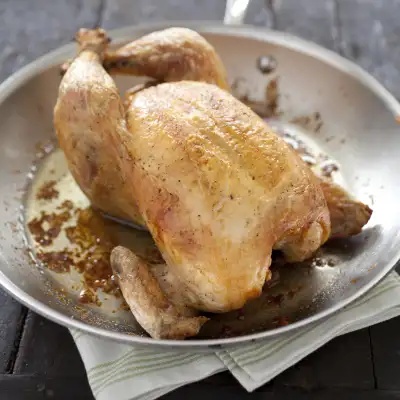
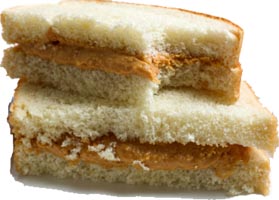
Peanut butter:
Peanut Butter is a treat for dogs that lasts them ages! Stuff about 1 teaspoon of unsalted peanut butter mixed with some dry food into a toy and your dog will be preoccupied for hours. It can be spread inside hollow bones, or you can just let them OCCASIONALLY lick it from a spoon. Need to administer medications to your dog? Tuck your dog’s pills into a bit of peanut butter and place it onto his tongue toward the back of his mouth.
Peanut butter is packed full of protein, healthy fats, niacin, vitamin B and vitamin E. Unsalted peanut butter is the best, as too much salt is just as bad for dogs as it is for people. Make sure you check your peanut butter DOES NOT contain sugar substitutes like Xylitol, which can be deadly for dogs. It is best to limit your dog’s peanut butter intake, as it is high in fat and calories and may lead to weight gain.
Apples:
Apples are wonderful crunchy treats to feed your dog. Apples with the skin on are full of plant chemicals (phytonutrients) that are thought to be protective against some types of cancer in humans. Apples are a source of fibre and carbohydrates. Apple seeds, however, contain cyanide so your dog should not be allowed to eat the core. Though the effects of a few apple seeds will likely not harm your dog, the deleterious effects can accumulate over time if allowed to eat apple seeds regularly.
To safely feed your dog apples, slice the apples into smaller pieces and make sure no seeds are present. Another good idea is to start in small quantities so your dog can become accustomed to a new ingredient in their diet. Also, like in people, eating too many apples can cause a dog to have a bellyache and diarrhea, so like all treats to give your dog, serve them in moderation.
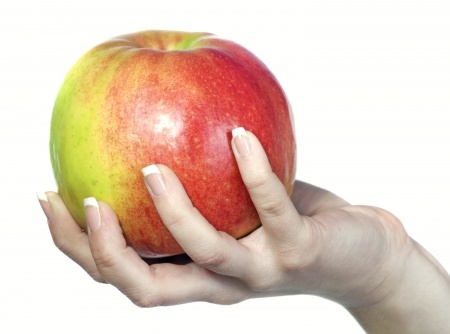

Carrots:
Carrots are high in fibre, low in calories and a naturally sweet veggie rich in antioxidants and beta-carotene, which converts into eye-healthy vitamin A. They make great treats to feed your dog. Chewing raw carrots is also beneficial for your dog’s teeth. If you’ve got an overweight dog, carrots are a great choice for treats because of their low-calorie content. For smaller dogs, you’ll want to give them sliced or baby carrots, so they can break the carrots apart easily without choking on them. Larger dogs love to break apart in pieces or wrap their paws around to chew on, like sticks.
Eggs:
Can dogs eat eggs? Well, it’s complicated. Eggs are an important source of nutrition for many predators; they are a great source of protein. They also contain essential fatty and amino acids. Eggs can even help settle a dog’s upset stomach. But if you serve your dog a raw egg, you do run the risk of salmonella exposure. And a regular diet high in raw eggs can lead to biotin deficiency. (Biotin is a B complex vitamin that supports healthy digestion, metabolism, and skin and cell growth.) The bottom line: it’s safer to serve your dog cooked or boiled eggs. Eggs are safe for dogs as long as they are fully cooked.

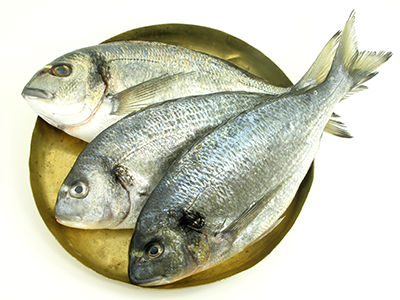
Fish:
Fish contains good fats and amino acids. It can make up a beneficial part of your dog’s balanced diet. Salmon and sardines are especially beneficial: salmon because it’s loaded with vitamins and protein, and sardines because they have soft, digestible bones for extra calcium. Like us, dogs can choke on bones. Make sure you’ve removed any stray ones before serving. In the case of feeding your dog raw fish, it’s better to be safe than sorry and properly cook all fish before feeding it to your pet. This is due to concerns about the parasites contained in fish that are normally killed by cooking.
Cheese:
As long as your dog isn’t lactose intolerant, dogs can eat cheese in small to moderate quantities. Cheese can be a great treat to feed your dog. In fact, cheese is often a great training tool, especially for puppies, and it is a good way to conceal pills for dogs that require medication.
Cheese contains protein, calcium, vitamin A, essential fatty acids, and B-complex vitamins. But should your dog eat cheese? Like most good things in life, is probably best fed in moderation, so go for low-fat varieties like cottage cheese or mozzarella. Cottage cheese is a choice for many dog owners because it’s bland and easy to digest. But remember that products often found in cottage cheeses such as garlic, onions, and chives are toxic to dogs.
